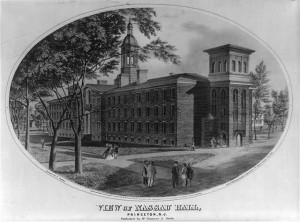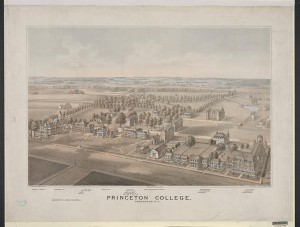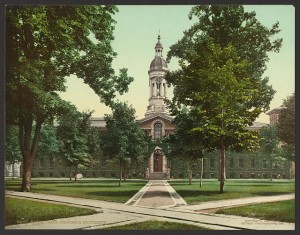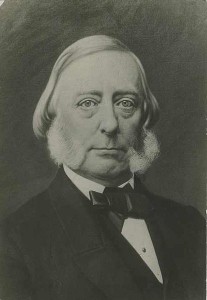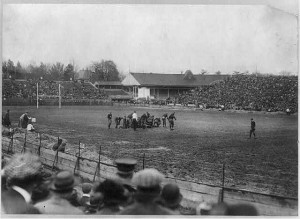From The New-York Times September 18, 1861:
PRINCETON COLLEGE.; Three Students Dismissed for Pumping on a Secessionist.
Correspondence of the New-York Times. PRINCETON, N.J., Sunday,Sept. 15, 1861.
Within the last few days the venerable shades of Nassau Hall have witnessed some stirring events. Although removed from the immediate scene of action, her loyal sons have, from the beginning of the contest, felt the deepest interest in the struggle to maintain the integrity of our Government, and gladly, ere this, if duty had called, would they all have gone forth to lend their aid for the suppression of rebellion. But they have found an important field of labor here, and have already rendered valuable assistance to the Government in suppressing treason at home.
The majority of the Southern students left upon the outbreak of hostilities. The few that remained, although sufficiently warned, have been bold in their rejoicings ever attempts of traitors to impede the onward course of the Government. One or two have even dared to cheer for JEFF. DAVIS, the arch-traitor. The Union-loving students, willing to endure even to the bound where patience ceases to be a virtue, could not suppress their patriotic indignation, and, accordingly, upon Thursday seized one of the most ultra Secessionists in the institution, and, placing him under the college pump, endeavored to put out the secession fire which had so seared his heart. HOWARD REEDER, son of Gov. REEDER, ISAAC K. CASEY, son of JUDGE CASEY, and SAMUEL B. HUEY, son of a prominent citizen of Philadelphia, were summoned before the faculty of the College, and charged with pumping the Secessionist. They frankly confessed that they not only had done it, but that they were still willing to put forth every lawful effort for the suppression of treasonable utterances, and that personal antipathy had nothing to do with their course. The faculty concluded to dismiss the students named above, and their fellows, without distinction of class, held a meeting, in which they passed some resolutions disapproving the action of the faculty, and pledging themselves to do all in their power to secure the return of the dismissed students.
On Saturday afternoon about 150 students collected in the college campus, and thence drew the dismissed students through the streets of Princeton on a barouche, enveloped by the Stars and Stripes, to the depot. The students of the Seminary and a large number of the citizens of the place joined in the procession. An excellent band was in attendance. Flags were floating all along the streets. Union-loving citizens were cheered, and sympathizers with the “peculiar institution” groaned. UNION.
The Times’ title sure caught my attention.
Kansapedia says Andrew H. Reeder was the first Territorial Governor of Kansas. He changed from pro-South to free-state during his tenure and was basically forced out of the state in 1856. He escaped Kansas disguised as a woodchopper and returned to Pennsylvania where he was active in Republican politics. It is said that
At the outbreak of the Civil war he was appointed a brigadier-general by President Lincoln, but owing to his advanced age he did not enter the army. Three of his sons, however, took up arms in defense of the Union.
President Lincoln appointed an Isaac K. Casey as Aide-de-Camp to Major General John E. Wool in 1862.
Samuel B. Huey graduated from Princeton and served a short time in the Union Navy. He was a President of the Philadelphia Board of Education.

